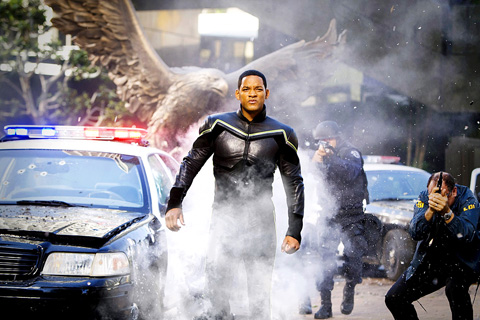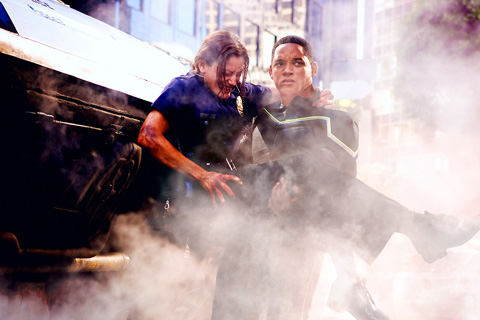Hancock shambles along pleasantly enough for an hour or so. Of course, your pleasure depends on how much you like watching Will Smith act surly as an alcoholic, irresponsible superhero whose crime fighting causes so much property damage he's being sued by half of Los Angeles. Smith does this act very well, for the record, but he's not the admirable, crowd-pleasing guy casual moviegoers love.
He is funny, though, belligerent and kind of stupid. He's sure to react badly when people give him grief, which is all the time.
It's not just a harder-edged, but a more committed comic performance than those of Hitch or the Men in Black films. And it needs to be. Hancock's script, credited to Vince Gilligan and Vy Vincent Ngo and surely worked over by superwriter producers Akiva Goldsman and Michael Mann, doesn't have the greatest gags or lines in the world. Delivery is at least seven-tenths of the humor, and Smith delivers expertly.

PHOTO COURTESY OF SONY
So does Jason Bateman, as the well-meaning publicist Ray Embrey, who insists on fixing Hancock's image after the superguy saves his life. Ray's wife, Mary, is kind of a wet blanket (played by the humor-challenged Charlize Theron, how could she not be?). Someone has to worry about having a freak with the strength and judgment of a charging rhino staggering around the house and influencing their kid.
So things go along amusingly as Hancock tries to reform and succeeds enough to win a little public love. We're waiting for a real test of his newfound sobriety to hit - which wouldn't be unimaginative storytelling, just the logical direction the plot needs to go in to resolve the key issues it's set up.
We're also wondering about what Hancock is and where he came from (the seemingly immortal being can't remember anything before the 1930s), but it's not all that important.

PHOTO COURTESY OF SONY
So, guess what the movie's third act is all about? That's right, the least-relevant theme. And it doesn't address that very well. All these new rules and reasons for Hancock and his powers are set up, then contradicted whenever a cheap emotional moment or action thrill can be grabbed.
Oh, and it stops even trying to be funny. Stops. Right. Dead.
The tone changes so radically, it's like Hancock suddenly thinks it's a genre movie, like No Country for Old Men, except it's just baffling without being profound.

PHOTO COURTESY OF SONY
Too bad. Lord knows the superhero movie needs the kind of sarcastic, angry ridicule director Peter Berg brought to his debut film, Very Bad Things. And the scruffy, handheld camera aesthetic Berg perfected on Friday Night Lights and The Kingdom is a nice tool for sullying the pristine CGI unreality of all those Marvel Comics movies we've been buried in.
That all has its place in Hancock until the movie veers toward mythos-building and myth-making. In other words, until it becomes like all those other super movies, this one started out pointing at and saying, "That's absurd; let's get loaded and rip 'em to shreds."

PHOTO COURTESY OF SONY

One of the biggest sore spots in Taiwan’s historical friendship with the US came in 1979 when US president Jimmy Carter broke off formal diplomatic relations with Taiwan’s Republic of China (ROC) government so that the US could establish relations with the People’s Republic of China (PRC). Taiwan’s derecognition came purely at China’s insistence, and the US took the deal. Retired American diplomat John Tkacik, who for almost decade surrounding that schism, from 1974 to 1982, worked in embassies in Taipei and Beijing and at the Taiwan Desk in Washington DC, recently argued in the Taipei Times that “President Carter’s derecognition

This year will go down in the history books. Taiwan faces enormous turmoil and uncertainty in the coming months. Which political parties are in a good position to handle big changes? All of the main parties are beset with challenges. Taking stock, this column examined the Taiwan People’s Party (TPP) (“Huang Kuo-chang’s choking the life out of the TPP,” May 28, page 12), the Democratic Progressive Party (DPP) (“Challenges amid choppy waters for the DPP,” June 14, page 12) and the Chinese Nationalist Party (KMT) (“KMT struggles to seize opportunities as ‘interesting times’ loom,” June 20, page 11). Times like these can

June 23 to June 29 After capturing the walled city of Hsinchu on June 22, 1895, the Japanese hoped to quickly push south and seize control of Taiwan’s entire west coast — but their advance was stalled for more than a month. Not only did local Hakka fighters continue to cause them headaches, resistance forces even attempted to retake the city three times. “We had planned to occupy Anping (Tainan) and Takao (Kaohsiung) as soon as possible, but ever since we took Hsinchu, nearby bandits proclaiming to be ‘righteous people’ (義民) have been destroying train tracks and electrical cables, and gathering in villages

Dr. Y. Tony Yang, Associate Dean of Health Policy and Population Science at George Washington University, argued last week in a piece for the Taipei Times about former president Ma Ying-jeou (馬英九) leading a student delegation to the People’s Republic of China (PRC) that, “The real question is not whether Ma’s visit helps or hurts Taiwan — it is why Taiwan lacks a sophisticated, multi-track approach to one of the most complex geopolitical relationships in the world” (“Ma’s Visit, DPP’s Blind Spot,” June 18, page 8). Yang contends that the Democratic Progressive Party (DPP) has a blind spot: “By treating any